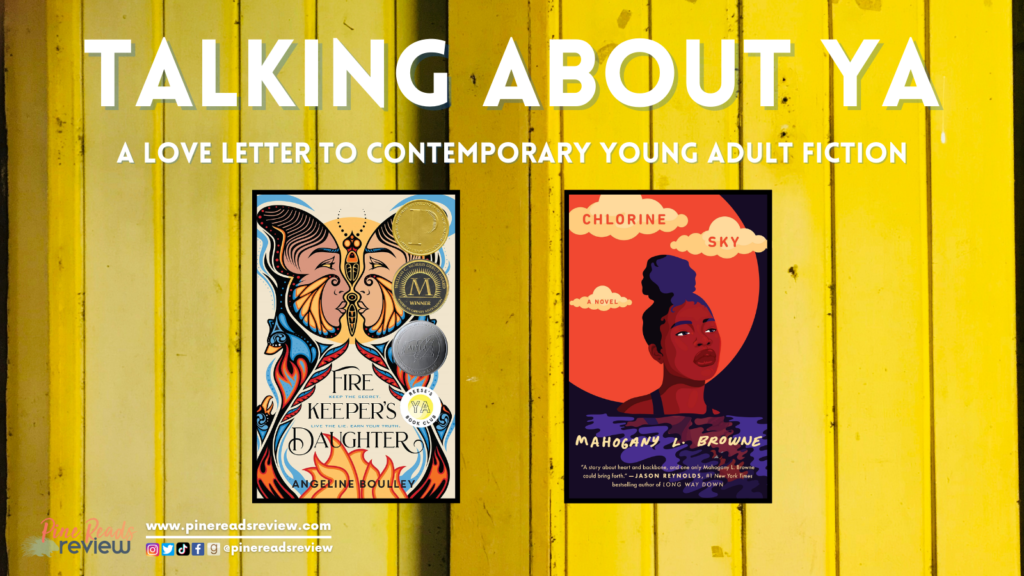
I think it’s pretty fair to say that here at Pine Reads Review we are big fans of contemporary young adult fiction, and I am no exception – I can hardly get enough! Lately, as I’ve been looking across my long list of TBR’s (to be read) spanning across multiple genres and age ranges, I’ve been wondering: why do I find myself choosing contemporary young adult fiction so often these days? Is it the captivating love stories and charming tropes that draw me in? Or is the allure a symptom of something deeper at work under the surface? What is it that makes it such a powerful genre? I resent the sentiment that enthusiasm for the genre can only be chalked up to effective marketing, so I’m putting all my cards on the table and offering a love letter to contemporary YA fiction.
Though not always at the forefront, love plays an integral role in YA fiction. And it doesn’t always have to be romantic (even though witnessing two people fall for each other will always give me the warm fuzzies)! Love, outside of romance, can take the form of complex friendships, familial relationships, or simply caring for the world around you. But, it’s not always sunshine and roses either– love can be born, rekindled, or lost all together! In Chlorine Sky, one of my favorite contemporary YA reads to date (and one we have quite an in-depth blog about), a combination of the three occurs. The tumultuous friendship between Sky and Lay Li speaks to the capacity that contemporary YA fiction holds for representation of impermanent, complicated, and multidimensional love. Complex and compelling relationships reflect our realities, and sometimes reading about them can be a huge help in making sense of our own relationships – an indispensable strength.
Tropes are another common occurrence in contemporary YA novels. Though often predictable, the addition of a trope can easily be comforting and allow us to find our preferred content. We get to watch the characters grow alongside each other and discover new perspectives, but sometimes tropes also present the opportunity for a twist! Subverting a trope can be a great surprise for readers, and it can end up providing powerful commentary. In Firekeeper’s Daughter, another one of my favorite contemporary YA picks, Angeline Boulley utilizes the enemies-to-lovers relationship between Daunis and Jamie to do just that. Daunis’ rejection of Jamie at the end of the book speaks to what a healthy declaration of love should look like and its relationship to self-worth. No matter the end result of the trope, we get to witness the transformation and the discovery of what the character values most; thus, putting our own needs and desires into perspective.
This is where I come across the ‘something deeper at work’ – a common thread. These subjects and motifs consistently offer us knowledge and insight. This knowledge and insight is described by Dr. Rudine Sims Bishop, mother of multicultural children’s literature studies, as the “mirror, window, and sliding glass door.” At its core, children’s literature is supposed to act as a mirror for our own reflections, a window to see a different perspective, and as a sliding glass door we can step into a new world through. Since YA literature has been born from children’s literature, it holds the same sentiment. In YA, we’re exposed to at least one of these three lenses in any given book. The function of these surfaces embedded within contemporary YA makes impact implicit for its readership. Essentially– these narratives are meant to be deeply reflective, observant, and permeable.
Now, if your favorite author or series is feeling a little cheapened– wait, bear with me! Yes, there is a targeted intention in YA literature, but when you think about it, the intention is simply to connect our experiences with something, or someone outside ourselves. The intention simply means that we matter in the creation of the narrative, and that totally lends itself to our connection to the novel. Not to mention that contemporary YA is often inspired by the author’s lived experiences, so through connection with the novel, we’re also connecting with another person, which is always a genuine exchange. And this connection to others, to ourselves – is it not the most powerful effect of this genre? The intimacy, vulnerability, and connection inherent within its form is an act of solidarity; one that says ‘huh, you’re not so alone after all.’
Contemporary YA fiction has the capacity to change us, to impact us. Unlike other genres and forms of media, this intention is baked into its purpose. It’s not afraid to speak up for something or someone because YA literature is never neutral. The genre is dedicated to addressing the most genuine personal experiences all while simultaneously delivering the most captivating love stories or charming tropes that further add to the ultimate enjoyment of the work.
So, this brings me back to the query that drew me to explore my love for contemporary YA in the first place: why are these the books at the top of my TBR pile? My answer? Look at the state of the world… sigh. The constant doom scroll and endless barrage of injustices is an everyday occurrence. And when I feel powerless in the world, it feels good to connect with myself and others. Contemporary YA offers me a lifeline when I feel the future’s looking bleak and hopeless. Its gift of solidarity provides me with resilience and replenishes my hope for the future – hope for change, strength, community, and empowerment.
In the spirit of contemporary YA, let’s connect! What keeps you coming back for more? What does it mean to you to see and be seen through YA fiction? What’s your next contemporary YA read? Anything! After all, we can always use a little more community in our lives.
PRR Writer & Editor, Megan Milton